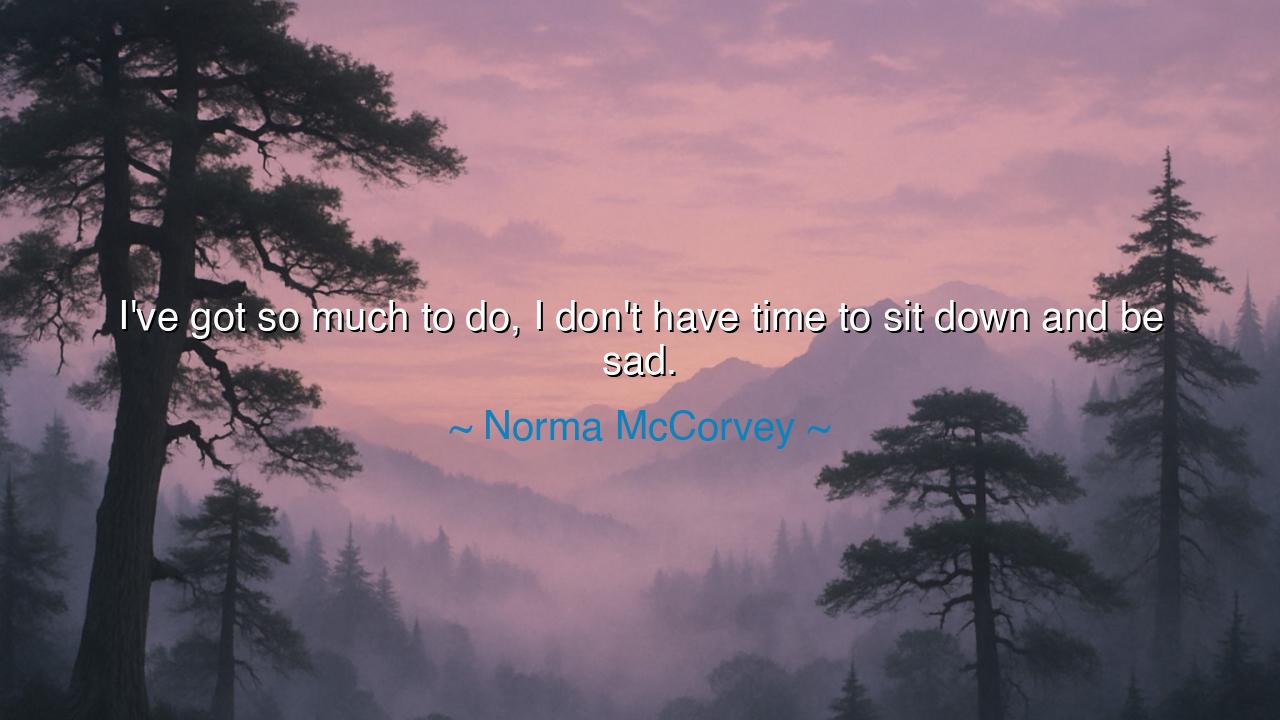
I've got so much to do, I don't have time to sit down and be sad.






There is a quiet fire in the words of Norma McCorvey, who once said, “I’ve got so much to do, I don’t have time to sit down and be sad.” In this simple statement lies the voice of a woman who carried both sorrow and strength, and who chose, amid the storms of her life, to keep moving forward. Hers is not the joy of denial, but the discipline of endurance — the decision to rise each day with purpose rather than be consumed by regret. To understand this quote is to understand that life’s meaning is often not found in comfort, but in action, in the daily work that pulls us out of despair and into renewal.
The origin of this quote reaches into McCorvey’s complex and turbulent life. Known to history as “Jane Roe” of the landmark Roe v. Wade case, she became a symbol for one of the most divisive issues of her age. Yet beyond the headlines and politics was a woman who lived with contradiction — one who endured public scrutiny, spiritual conflict, and deep personal pain. In later years, McCorvey devoted herself to advocacy, community service, and reflection. Her words were not spoken in arrogance, but in weary wisdom: a recognition that the only way to heal a broken spirit is to give it something to build.
When she says, “I don’t have time to sit down and be sad,” she is not rejecting sorrow, but refusing to let it rule her. Sadness is a natural visitor to every heart — it teaches, cleanses, and softens us. But when sadness becomes a throne upon which we sit too long, it chains us to the past. McCorvey’s words remind us that purpose is the antidote to paralysis. The human soul was not made to dwell forever in reflection; it was made to move, to act, to create. The ancient Stoics taught this truth long before her: that though pain is inevitable, we can choose our response. Even in darkness, there is work to be done.
We see this same wisdom in the story of Eleanor Roosevelt, who, after losing her husband, President Franklin D. Roosevelt, could have retreated into grief and silence. Instead, she poured her energy into human rights work, becoming one of the most influential women of the 20th century. She once said, “When you cease to make a contribution, you begin to die.” Like McCorvey, she understood that purpose heals where time alone cannot. By serving others, she transcended her own sadness. Work, when aligned with love and conviction, becomes a spiritual act — a form of redemption through motion.
McCorvey’s statement also carries a quiet defiance — a refusal to surrender to the weight of her own history. Her life was marked by regret, controversy, and reinvention, yet her determination to stay busy was a kind of resistance against despair. The ancients might have called this heroic perseverance — the quality of those who, though wounded, continue to build, to serve, to rise. In her ceaseless doing, McCorvey expressed a deeper philosophy: that every new act of effort is a chance to rewrite one’s story.
This quote also invites reflection on the nature of healing. Modern minds often think of healing as rest, stillness, and retreat. But the old wisdom — the wisdom of warriors, workers, and survivors — tells us that movement itself can mend the spirit. A farmer who plants despite grief, a mother who cares despite exhaustion, a teacher who inspires despite heartache — these are living embodiments of McCorvey’s truth. They understand that the heart’s renewal comes not from endless mourning, but from the steady rhythm of responsibility and purpose.
The lesson, then, is clear: do not wait for sadness to leave before you rise. Begin your work even while your heart is heavy. Let purpose lead you out of pain. When the weight of life bears down upon you, find something worth doing — something that lifts your gaze beyond yourself. You may not silence your sorrow, but you will transform it. Work, when done with love, is not an escape from grief but a pathway through it.
So remember, my children: to live is to move, to build, to serve. There will always be time for sorrow — but there is also a time to stand, to act, to turn pain into power. Like Norma McCorvey, say to yourself, “I’ve got so much to do.” For in that declaration is not denial, but triumph — the triumph of a spirit that chooses purpose over pity, and in doing so, discovers the sacred art of living forward.






AAdministratorAdministrator
Welcome, honored guests. Please leave a comment, we will respond soon